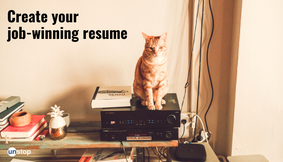Tips to ace your MBA admission interview

A lot of students give it their all to prepare for MBA entrance examinations, but cracking them is just not enough to get admission in your dream college. The real race starts at the last and the most important step of MBA admission interview.
These days B-Schools give a lot of weightage to interviews as they are looking for candidates who can add value to the class discussions, have clarity of thought, and can confidently put forth their views in their future workplace. In a short span of time, you have to prove why you deserve that seat more than other candidates who have a similar score as yours. So, here are the most important MBA admission interview tips to ensure that you outshine in your next interview.
The following points must be covered while you are preparing for MBA admission interviews:
- The most common MBA admission interview questions
- The Institute's analysis
- Knowledge of concepts related to your domain
- Current affairs and general knowledge
- The dress code and basic interview etiquettes
Let’s deep dive to help you prepare each point mentioned above:
What happens during an MBA admission interview?
This is the first and last chance the college gets to speak with you before they take a call on your candidature. Personal interview is hard, they will do whatever is required to make sure that you are the right candidate for a seat in their college, including evaluating you in ways you simply haven't imagined. The higher the competition at a specific institute, the harder the personal interview, and the higher is the probability of unexpected questions.
Four MBA admission interview questions you must prepare:
- Tell us about yourself?
- Why MBA?
- Why do you want to do an MBA from our college?
- What are your short term & long term goals?
The bare minimum of your personal interview consists of these four responses. Unless they are transparent and rational, it is unlikely for the PI to have a favorable result. If these four responses are in place and the applicant has a good attitude during the interview, the panel can also overlook the flaws displayed in the answers to other questions. Having understood this, with a crystal strategic clarity, we must begin our PI planning. We suggest that you put these responses on paper, have your trainer/mentor analyze them, and revisit them as many times as possible in accordance with the feedback you get.

Knowing the institution
You must study extensively about the institution you have applied for. The main area of this research should include the following:
The curriculum: At least you need to know the subjects you are going to learn in the first two semesters, the institution and faculty management, you need to know their names and qualifications, their field of expertise, their research work, etc.
Internships: Discover the sort of internships on offer. This is really important because this is directly linked to the implementation of your learning, maybe more significant than placements. Your successful completion of the course and the internship will always be conditional on any placements you earn.
The alumni: Find out who they are, where they live. When you can, contact them. They are an important source of information that is not published in the media about the institution and, in particular, the facets of the institution.
Knowledge of basic concepts
If you are a fresher, the panel will test your knowledge of the subjects that you have studied in your UG programme. Please ensure that the fundamentals of all your subjects have been revised. Most panels typically prefer to only test the fundamentals, and they can move on to other areas if the responses are satisfactory.
Applicants with work-experience will majorly be questioned on the nature of their occupation. The questions will come from the following areas: the duties, the head of reporting, the team you work in, the customers served, the problems encountered, the information about the business, both normal and unique (such as market size, stock price, the management, the investors, the competition etc.). You may also be asked about the areas of improvement for the organization as you view them. Most significantly, you could be asked about a clear reason why you want to leave the business and pursue more formal education. And this response better not be 'more capital' or a cliché like 'moving up the corporate ladder'.
General knowledge and current affairs
When it comes to general knowledge, most panels typically appear to ask you questions that are relevant to your field of study or job elsewhere. It is expected that you will know the latest happenings in your field.
The dress code and basics for the day
For men
- A perfectly ironed formal full-sleeve shirt and trousers should be worn.
- Polished shoes (black or brown)
- A tie and a belt (knotted properly)
- Wear soft colors/ pastel shades.
- On the day of the interview, do not forget to sport a 'clean look'. Shave properly.
- A mild deodorant.
- It is not mandatory to wear a blazer. If you have one, then you should wear it to make it look cleaner.
Women
- Salwar-kameez/saree/skirt/trousers with a pastel-colored shirt should be worn.
- If you have long hair, plait it neatly or style it in a way that doesn't appear unkempt.
- Polished bellies of formal form (black). Sandals intended for official occasions are perfect.
The first step in the room and the body language
You will be asked by the assistants present there or one of the panel members to enter the room after a minute or so. Ask for permission "May I come in, Sir/Madam?" to enter the room. Come in with a smile. Greet the panel in its entirety. If they do not do it themselves, ask for permission to sit. Thank them when asked to sit down.
Body language is a type of mental and physical ability of human non-verbal communication consisting of body posture, gestures, facial expressions, and eye movements. Body language, or nonverbal communication, let interviewers know more about you than what you're telling them. This is going to illustrate that you are secure.
How to put across your points?
Use a formal tone, the interviewer might speak in Hindi or casually. But you've got to stay serious and formal. Some of us are in the habit of mixing up english with the vernacular. In your interview, avoid doing this. Do not make any use of slang. Use brief phrases that convey the essence of what you wish to say.
What are interviewers looking for and who makes the cut?
- Aspects that make you stand out from the other applicants.
- Familiarity with the community, history, programs, and facilities of the school.
- Clearly defined priorities for your post-MBA career.
- Genuinity, integrity, trust, dedication, concentration, and ethics.
- Outstanding abilities in teamwork and leadership.
- Attitude directed to the squad, tact, and composure.
Always be honest. Don’t act arrogant and remember that the table belongs to the panel.
All the best to all the candidates!
Check out other stories and interview experiences:
- IIM Ahmedabad interview questions, preparation tips and other details -By Hemanth Reddy Varakantham, 99.13 percentile, IIM Ahmedabad - Part II
- How you can tackle the classic question “Why should we hire you?” during an interview
- The subtle art of not giving up in order to convert MBA interviews -By Nitesh Singh from IIFT Kolkata
- Zoom into an interview on a Zoom interview for Zoom
- IIFT interview questions, format and other details -By Nitesh Singh, IIFT Kolkata
Login to continue reading
And access exclusive content, personalized recommendations, and career-boosting opportunities.














Comments
Add comment